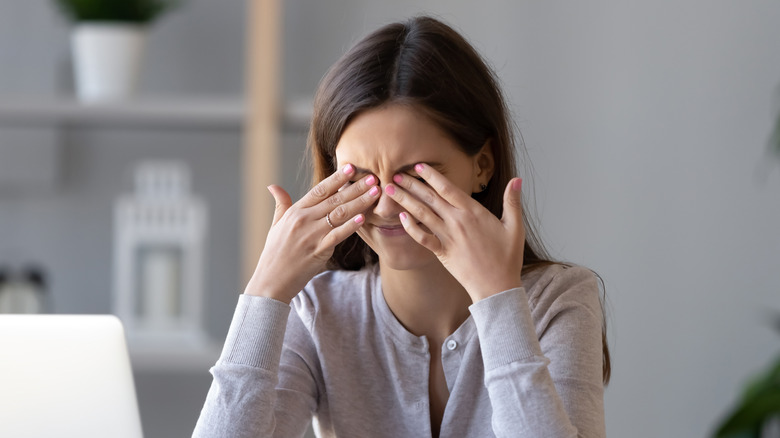Surprising Side Effects Of Wearing Sunglasses
Sunglasses have long been a fashion statement, but they are more than that. They protect our eyes from direct sunlight and ultraviolet light that can otherwise be harmful to the eyes. A 2014 study funded by the U.S. National Eye Institute revealed that UV radiation could damage proteins found in the eye's lens. Protein damage, in the long run, can lead to cataracts and other issues with the eyes (via NIH).
While it might be tempting to sport sunglasses wherever we go — indoor or outdoors — they are only healthy when you limit their use. Wearing them all the time may cause more harm than good to the eyes, leading to surprising side effects. Even though sunglasses might improve your eyesight, they might not be the best solution to prevent potential eye problems.
Here's more on the surprising side effects of wearing sunglasses and how they may not be a one-stop solution to many eye problems.
Sunglasses may lead to eye pain and discomfort
One of the significant side effects of wearing sunglasses is eye pain and strain. Notice how a sudden change of light in your surroundings really stresses out the eyes?
Your pupils dilate when you wear sunglasses for a long time, and your eyes get used to less light. Whenever you remove the sunglasses, your eyes feel strained, resulting from the retina being unable to adjust to brighter lights. To avoid discomfort, you might want to avoid sudden sun exposure and let your eyes gradually get used to the light.
It might be comfortable for people with photophobia aka sensitivity to light to wear sunglasses for extended periods. However, doctors do not recommend doing so, as wearing sunglasses that come with dark lenses might worsen symptoms of photophobia. Wearing sunglasses all the time might also develop photophobia in people who'd previously shown no signs of it (via All About Vision).
Wearing sunglasses might affect your sleep schedule
Sunglasses can also affect your sleep schedule.
The retina's light receptors play an essential role in controlling the circadian rhythm. These receptors absorb light, which can make it challenging for your eyes to tell the difference between night and day, and ultimately lead to a disruption in your sleep routine (via Sleep Health).
Consequently, sleep deprivation might lead to other issues throughout our body — from our immune system to digestive system and endocrine system, among others (via Healthline).
The use of sunglasses primarily revolves around the protection of eyes from UV radiation. Even though it might be fun to keep wearing them, the consequences feel stacked up against the reward. So it's not a great idea to wear sunglasses all the time if you want to avoid the associated side effects.


